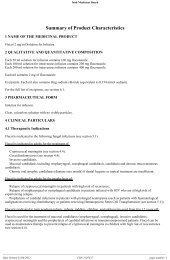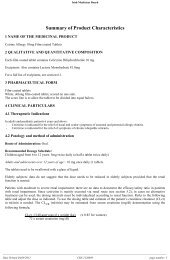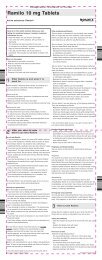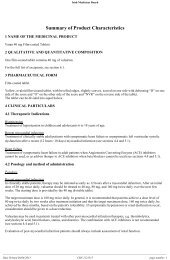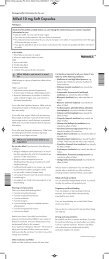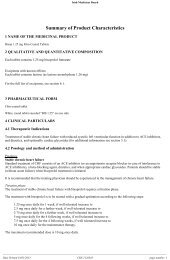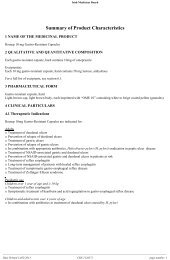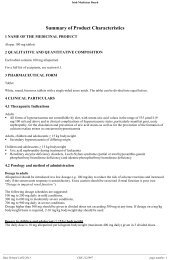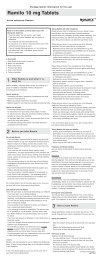Bisop 5 mg PIL - Rowex Ltd
Bisop 5 mg PIL - Rowex Ltd
Bisop 5 mg PIL - Rowex Ltd
You also want an ePaper? Increase the reach of your titles
YUMPU automatically turns print PDFs into web optimized ePapers that Google loves.
<strong>Bisop</strong> 5 <strong>mg</strong> Film-Coated TabletsPACKAGE LEAFLET: INFORMATION FOR THE USER<strong>Bisop</strong>rolol fumarateRead all of this leaflet carefully before you start taking this medicine.- Keep this leaflet. You may need to read it again.- If you have any further questions, ask your doctor or pharmacist.- This medicine has been prescribed for you. Do not pass it on to others. It may harm them, even if their symptoms are the same asyours.- If any of the side effects gets serious, or if you notice any side effects not listed in this leaflet, please tell your doctor or pharmacist.In this leaflet:1. What <strong>Bisop</strong> is and what it is used for2. Before you take <strong>Bisop</strong>3. How to take <strong>Bisop</strong>4. Possible side effects5. How to store <strong>Bisop</strong>6. Further information1. WHAT BISOP IS AND WHAT IT IS USED FOR<strong>Bisop</strong> belongs to the group of medicinal products that are indicated as beta blockers. They protect the heart from too much activity.<strong>Bisop</strong> is used to treat:- High blood pressure- Angina pectoris (heart pain)- Heart failure causing breathlessness on exertion or fluid retention. In this instance, <strong>Bisop</strong>rolol may be given as an additionaltreatment to other medications for heart failure.2. BEFORE YOU TAKE BISOPDo not take <strong>Bisop</strong>• if you are allergic (hypersensitive) to bisoprolol fumarate or any of the other ingredients of <strong>Bisop</strong>• if you have a cardiogenic shock, a serious heart condition causing a rapid, weak pulse; low blood pressure; cold, clammy skin;weakness and fainting• if you have ever suffered from severe wheezing or severe asthma, as they can affect your breathing• if you are taking a drug called sultopride which is used to treat severe psychiatric disorders or a certain painkiller calledfloctafenine (refer also to the section “Taking other medicines”)• if you have a slow heart rate (less than 60 beats per minute). Ask your doctor if you are not sure.• if you have very low blood pressure• if you have severe blood circulation problems (which may cause your fingers and toes to tingle or turn pale or blue)• if you have certain serious heart rhythm problems• if you have heart failure which has just occurred or is not stabilised and is requiring hospital treatment• if you have a condition in which there is an accumulation of excessive acid in the body known as metabolic acidosis. Your doctorwill be able to advise you• if you suffer from a tumour of the adrenal glands known as phaeochromocytoma which is untreatedTell your doctor if you are not sure about any of the above.Take special care with <strong>Bisop</strong>• if you suffer from wheezing or difficulty breathing (asthma), bronchodilating therapy should be given concomitantly. A higher doseof beta2-stimulants may be needed.• if you have diabetes. The tablets can hide the symptoms of low blood sugar (such as accelerated heart beat rate, palpitations orsweating).• if you are fasting from solid food• if you are treated for hypersensitivity (allergic) reactions. <strong>Bisop</strong>rolol may increase the hypersensitivity to the substances you areallergic to and increase the severity of the hypersensitivity reactions. Treatment with adrenalin may not then have the desiredresult. A higher dose of adrenalin (epinephrine) may be needed.• with 1st degree heart block (conduction disorder in the heart)• if you suffer from Prinzmetal’s angina which is a type of chest pain caused by spasm of the coronary arteries that supply theheart muscle• if you have any problems with the circulation to the extremities of the body such as hands and feet• if you consult a doctor, attend hospital or the dentist for surgery involving anaesthetic, let them know what medicines you are taking• in combination with calcium antagonists, such as verapamil and diltiazem. Concomitant use is not recommended, see also “takingother medicines”.• if you suffer (or have suffered) from psoriasis (a recurrent skin disorder involving scaling and dry skin rash)• with phaeochromocytoma (tumour of the adrenal marrow). Your doctor will need to treat this before prescribing bisoprolol for you.• if you have a thyroid problem. The tablets can hide symptoms of an overactive thyroidThere is so far no therapeutic experience of bisoprolol treatment of heart failure in patients with the following diseases and conditions:• diabetes mellitus treated with insulin (type I)• severe kidney disease• severe liver disease• certain heart diseases• heart attack within 3 monthsTreatment of heart failure with <strong>Bisop</strong> requires regular medical monitoring. This is absolutely necessary, particularly at the beginningof treatment.Treatment with <strong>Bisop</strong> must not be discontinued abruptly unless for compelling reasons.For patients with hypertension and angina pectoris and accompanying heart failure treatment should not be stopped abruptly.The dosage should be diminished slowly by a weekly halving of the dose.Consult your physician if one of the above warnings is applicable to you, or has been in the past.Taking other medicinesPlease tell your doctor or pharmacist if you are taking or have recently taken any other medicines, including medicines obtainedwithout a prescription. Certain medicines cannot be used at the same time, while other drugs require specific changes (in the dose,for example).Always tell your doctor if you are using or receiving any of the following medicines in addition to <strong>Bisop</strong>:• Medicines for controlling the blood pressure or medicines for heart problems (such as amiodarone, amlodipine, clonidine, digitalisglycosides, diltiazem, disopyramide, felodipine, flecainide, lidocaine, methyldopa, moxonidine, phenytoin, propafenone, quinidine,rilmenidine, verapamil)• Sedatives and therapies for psychosis (a mental illness) e.g. barbiturates (also used for epilepsy), phenothiazines (also used forvomiting and nausea) and sultopride• Medicines for depression e.g. tricyclic antidepressants, MAO-A inhibitors• Medicines used for anaesthesia during an operation (see also “Take special care with <strong>Bisop</strong>”)• Certain painkillers (for instance acetyl salicylic acid, diclofenac, floctafenine, indomethacin, ibuprofen, naproxen)• Medicines for asthma, blocked nose or certain eye disorders such as glaucoma (increased pressure in the eye) or dilation(widening) of the pupil• Certain medicines to treat shock (e.g. adrenaline, dobutamine, noradrenaline)• Mefloquine, a medicine for malaria• The antibiotic rifampicin• Ergotamine derivatives for migraineAll these drugs as well as bisoprolol may influence the blood pressure and/or heart function.- insulin or other products for diabetes. The blood glucose reducing effect may be enhanced.Symptoms of low blood glucose level can be masked.Taking <strong>Bisop</strong> with food and drink<strong>Bisop</strong> may be taken with or without food and should be swallowed whole with a drink of water.The dizziness and light-headedness that may be caused by <strong>Bisop</strong> can be made worse if you drink alcohol. If this happens to you,you should avoid drinking alcohol.Pregnancy and breast-feeding<strong>Bisop</strong> may be harmful to the pregnancy and/or the unborn child. There is an increased possibility of premature birth, miscarriage,low blood sugar level and reduced heart rate of the child. The growth of the baby may also be affected. Therefore, bisoprolol shouldnot be taken during pregnancy.It is not known if bisoprolol is excreted in the breast milk and therefore it is not recommended while breast-feeding.Ask your doctor or pharmacist for advice before taking any medicine.Driving and using machinesNo studies on the effects on the ability to drive and use machines have been performed.These tablets may make you feel tired, drowsy or dizzy. If you suffer from these side effects, do not operate vehicles and/ormachines. Be aware of the possiblity of these effects, particularly at the beginning of the treatment, with changes in medication andwith use in combination with alcohol.Important information about some of the ingredients of <strong>Bisop</strong><strong>Bisop</strong> contains lactose. If you have been told by your doctor that you have an intolerance to some sugars, contact your doctorbefore taking this medicinal product.3. HOW TO TAKE BISOPAlways take <strong>Bisop</strong> exactly as your doctor has told you. You should check with your doctor or pharmacist if you are not sure.Your doctor will tell you how many tablets to take. You should take <strong>Bisop</strong> in the morning, before, with or after breakfast. Swallow thetablet/s with some water and do not chew or crush them.The usual dose isAdultsElevated blood pressure/angina pectoris:The dose is determined individually.The recommended starting dose is 5 <strong>mg</strong> once daily.The usual dose for adults is once daily 10 <strong>mg</strong>. Your doctor may decide to increase or decrease the dose.The maximum dose is once daily 20 <strong>mg</strong>.Severe kidney or severe liver function disorderIf you suffer from a severe kidney or severe liver function disorder: maximum 10 <strong>mg</strong> per day.ElderlyNormally no dose adjustment is required. Your doctor will start therapy with the lowest possible dose.Children and adolescentsThere is no paediatric experience with bisoprolol, therefore its use is not recommended in this age group.Heart failure (reduced pumping strength of the heart):Before you start using <strong>Bisop</strong>, you already use an ACE-inhibitor, diuretic or heart glycoside (heart/blood pressure product).The dose will be increased gradually until the dose that is suitable for you has been found:1.25 <strong>mg</strong> once daily for 1 week. If this is well tolerated, the dose may be increased to:2.5 <strong>mg</strong> once daily during the next week. If this is well tolerated, the dose may be increased to:3.75 <strong>mg</strong> once daily during the next week. If this is well tolerated, the dose may be increased to:5 <strong>mg</strong> once daily during the next 4 weeks. If this is well tolerated, the dose may be increased to:7.5 <strong>mg</strong> once daily during the next 4 weeks. If this is well tolerated, the dose may be increased to:10 <strong>mg</strong> once daily as a maintenance dose.Maximum dose: once daily 10 <strong>mg</strong>.The doctor will determine the optimum dose for you amongst others based on possible side effect.After the very first dose of 1.25 <strong>mg</strong> the doctor will check your blood pressure, heart rate, heart function disorders.
Liver or kidney function disordersThe doctor will be extra careful with the increasing of the dose.Elderly peopleNormally speaking an adjustment of the dose is not needed.Children and adolescentsBecause there have not been any studies on the effects of <strong>Bisop</strong> in children, <strong>Bisop</strong> is not recommended for this age group.If you notice that the effect of <strong>Bisop</strong> is too strong or not strong enough, please consult your doctor or pharmacist.Place the tablet on a hard, flat surface with the scored side at the top.Press with the thumb on the middle of the tablet and the tablet will break into two halves, press with the thumb in themiddle of each half and you will have four parts.Duration of the treatment<strong>Bisop</strong> will usually be used long term.If you take more <strong>Bisop</strong> than you shouldIf you have accidentally taken more than the prescribed dose, tell your doctor/pharmacist immediately. Take any remaining tabletsor this leaflet with you so the medical staff know exactly what you have taken. Symptoms of overdose may include dizziness,light-headedness, fatigue, breathlessness and/or wheezing. Also, there may be reduced heart rate, reduced blood pressure,insufficient action of the heart and a low blood glucose level (which may involve feelings of hunger, sweating and palpitations).If you forget to take <strong>Bisop</strong>Do not take a double dose to make up for a forgotten dose. Take the normal dose as soon as you remember and then carry onwith the usual dose the next day.If you stop taking <strong>Bisop</strong>Treatment with <strong>Bisop</strong> must not be stopped abruptly. If you suddenly stop taking this medicine your condition may get worse. Instead,it must be reduced gradually over a few weeks as advised by your doctor.If you have any further questions on the use of this product, ask your doctor or pharmacist.4. POSSIBLE SIDE EFFECTSLike all medicines, <strong>Bisop</strong> can cause side effects, although not everybody gets them.Side effects can occur with the following frequencies:very common: affects more than 1 user in 10common: affects 1 to 10 users in 100uncommon: affects 1 to 10 users in 1,000rare: affects 1 to 10 users in 10,000very rare: affects less than 1 user in 10,000not known: frequency cannot be estimated from the available dataSide effects that could occur are:Very common:• slow heartbeat. In the treatment of hypertension or angina pectoris this side effect occurs uncommonly.Common:• exhaustion. In the treatment of hypertension or angina pectoris this side effect occurs uncommonly.• dizziness, tiredness and headache (especially at the beginning of therapy in patients with hypertension and angina pectoris; theseare generally mild and often disappear within 1-2 weeks)• feeling of coldness or numbness in the extremities (fingers or toes, ears and nose); more frequent occurrence of a cramp-like painin the legs when walking• worsening of pre-existing heart failure. In the treatment of hypertension or angina pectoris this side effect occurs uncommonly.• very low blood pressure (hypotension) particularly in patients with heart failure• feeling sick (nausea), being sick (vomiting)• diarrhoea• constipationUncommon:• exhaustion, in the treatment of heart failure this side effect occurs commonly.• light-headedness, especially on suddenly standing up (orthostatic hypotension)• sleep disturbances• depression• slow heartbeat. In the treatment of heart failure this side effect occurs very commonly.• irregular heartbeat• worsening of pre-existing heart failure. In the treatment of heart failure this side effect occurs commonly.• patients with asthma or a history of breathing problems may experience difficulty in breathing• muscular weakness and crampsRare:• nightmares• hallucinations (imagining things)• syncope• hearing impairment• inflammation of the lining of the nose, causing a runny nose with irritation• allergic reactions (itching, flushed appearance, rash)• dry eyes from reduced tear flow (which can be very troublesome if you use contact lenses)• inflammation of the liver (hepatitis), causing abdominal pain, loss of appetite and sometimes jaundice with yellowing of the whitesof the eyes and skin, and dark urine• reduced sexual performance (potency disorder)• increased levels of blood lipids (triglycerides) and liver enzymesVery rare:• aggravation of the skin condition psoriasis or cause a similar dry, scaly rash and hair loss• itchiness or redness of the eye (conjunctivitis)• chest painIf any of the side effects gets serious, or if you notice any side effects not listed in this leaflet, please tell your doctor or pharmacist.5. HOW TO STORE BISOPKeep out of the reach and sight of children.Do not use <strong>Bisop</strong> after the expiry date which is stated on the carton and on the blister after “EXP”. The first two numbers match themonth, the last numbers the year. The expiry date refers to the last day of that month.This medicinal product does not require any special storage conditions.Medicines should not be disposed of via wastewater or household waste. Ask your pharmacist how to dispose of medicines nolonger required. These measures will help to protect the environment.6. FURTHER INFORMATIONWhat <strong>Bisop</strong> containsThe active substance is 5 <strong>mg</strong> bisoprolol fumarate.The other ingredients are:calcium hydrogen phosphate, anhydrouscellulose, microcrystallinemaize starch, pregelatinisedcroscarmellose sodiumsilica, colloidal anhydrousmagnesium stearatelactose monohydratehypromellosemacrogol 4000titanium dioxide (E171)iron oxide, yellow (E172)What <strong>Bisop</strong> looks like and contents of the pack- <strong>Bisop</strong> 5 <strong>mg</strong> film-coated tablets are yellow, round film-coated tablets with a cross score (divides the tablet in four) encoded “BIS 5”on one side and available in blister packs (OPA-Al-PVC/Al).Pack sizes: 7, 10, 14, 20, 28, 30, 50, 56, 60, 100, 10x30 film-coated tablets.Not all pack sizes may be marketed.Marketing Authorisation Holder and ManufacturersMarketing Authorisation Holder:<strong>Rowex</strong> <strong>Ltd</strong>., Bantry, Co. Cork, Ireland.Manufacturers:Salutas Pharma GmbH, Otto-von-Guericke-Allee 1, 39179 Barleben, Germany.Salutas Pharma GmbH, Dieselstrasse 5, 70839 Gerlingen, Germany.HEXAL AG, Industriestrasse 25, 83607 Holzkirchen, Germany.Rowa Pharmaceuticals <strong>Ltd</strong>., Newtown, Bantry, Co. Cork, Ireland.Lek Pharmaceuticals d.d, Verovškova 57, 1526 Ljubljana, Slovenia.Lek S.A., ul. Domaniewska 50 C, 02-672 Warszawa, Poland.This medicinal product is authorised in the Member States of the EEA under the following namesGermany:BISOHEXAL 5 MG FILMTABLETTENSpain:<strong>Bisop</strong>rolol Hexal 5 <strong>mg</strong> comprimidos recubiertos con película EFGIreland:<strong>Bisop</strong> 5 <strong>mg</strong> Film-Coated TabletsItaly:BISOPROLOLO HEXAL 5 MG COMPRESSE RIVESTITE CON FILMLuxembourg: BISOHEXAL 5 MGThe Netherlands: BISOPROLOLFUMARAAT 5 MG, FILMOMHULDE TABLETTENThis leaflet was last approved in 08/2011.I.M. L/321d 08-1146072990



